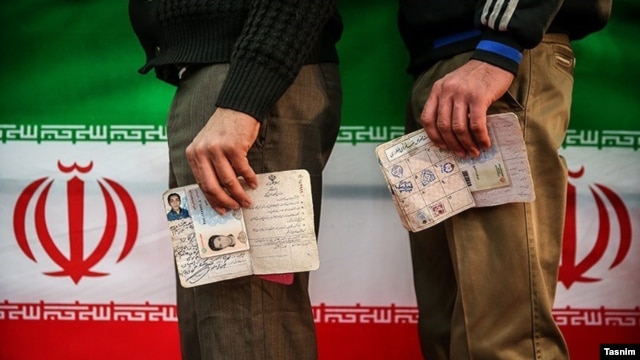Iran: Rohani, reformist allies make gains against conservative rivals in elections
| Publisher | Radio Free Europe/Radio Liberty |
| Publication Date | 28 February 2016 |
| Cite as | Radio Free Europe/Radio Liberty, Iran: Rohani, reformist allies make gains against conservative rivals in elections, 28 February 2016, available at: https://www.refworld.org/docid/570cdf7e15.html [accessed 31 May 2023] |
| Disclaimer | This is not a UNHCR publication. UNHCR is not responsible for, nor does it necessarily endorse, its content. Any views expressed are solely those of the author or publisher and do not necessarily reflect those of UNHCR, the United Nations or its Member States. |
Last updated (GMT/UTC): 28.02.2016 15:41
By RFE/RL
 Authorities in Tehran said that about 60 percent of eligible voters, around 35 million Iranians, had voted in elections for parliament and the country's powerful Assembly of Experts.
Authorities in Tehran said that about 60 percent of eligible voters, around 35 million Iranians, had voted in elections for parliament and the country's powerful Assembly of Experts.
Iranian officials said on February 28 that with 90 percent of the votes counted in the country's elections, President Hassan Rohani's reformist allies have won all 30 of Tehran's contested seats in the 290-seat parliament.
With the vote count nearing completion, results also showed reformists gaining against rival hard-liners in the Assembly of Experts – a body tasked with choosing Iran's next supreme leader.
The February 26 election was the first in Iran since the lifting of international sanctions under a nuclear accord reached by Rohani's government and world powers.
The reformist gains come despite the disqualification of thousands of candidates by hard-liners on Iran's powerful Guardian Council.
Rohani and his ally, the pragmatic former President Akbar Hashemi Rafsanjani, have won the majority of votes in the race for the Assembly of Experts in Tehran, according to the latest results.The Iranian capital will send 16 candidates to the assembly.
Rafsanjani came first and Rohani second, according to results issued by the Interior Ministry, which is conducting the elections.
Hard-line cleric Ahmad Jannati, who chairs the powerful Guardian Council, is in 15th position.
Reformists had urged voters to vote for a coalition of pro-reform and relative moderate candidates to prevent the reelection of Jannati and two other ultraconservative clerics – Mohammad Yazdi and Mohammad Taghi Mesbah Yazdi – to the assembly.
Ayatollah Yazdi, the current chairman of the assembly, was in 15th position.
Ayatollah Mesbah Yazdi could lose his seat according to the results, which have not been yet finalized.
In a statement issued on February 27 after the release of the initial results, Rohani said his government would cooperate with anyone elected in the vote.
"The competition is over. It's time to open a new chapter in Iran's economic development based on domestic abilities and international opportunities," Rohani said in the statement issued by the government news agency IRNA.
For his part, Rafsanjani called for unity and cooperation among different factions.
"The competition is over and the phase of unity has arrived," Rafsanjani said.
Ali Mazrouei, a former reformist lawmaker who now resides in France, told RFE/RL's Radio Farda that the make-up of Iran's future parliament is likely to be "different" from the current one dominated by hard-liners.
"I think the parliament will be relatively moderate," Mazrouei said in a telephone interview.
"The government could have more support in the parliament," he added.
Votes are still being counted on February 28, two days after the elections. .
Earlier forecasts made by the semiofficial Fars and Mehr News agencies indicate moderates and independents linked to them were leading so far against hard-liners in several cities, while conservatives appeared to have the upper hand elsewhere.
The semiofficial ILNA news agency said on February 27 that five women had been definitely elected to the parliament.
The Interior Ministry said about 60 percent of eligible voters, about 35 million Iranians, had cast ballots in the twin elections.
During its next eight-year term it could name the successor to Supreme Leader Ayatollah Ali Khamenei, who has been in power since 1989. The 76-year-old is not thought to be in the best of health.
Before the vote, reformists had complained that the Guardian Council, which supervises elections, refused to approve many of their most prominent candidates.
Only 40 percent of some 12,000 candidates were approved by the Guardian Council to run.
With reporting by RFE/RL's Radio Farda, Reuters, AP, and AFP, IRNA, Fars, ISNA, and Shargh
Link to original story on RFE/RL website
